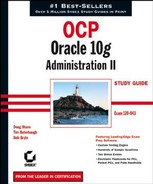3.1. An Overview of Non-Critical Files
The recovery of non-critical files is an important matter that you should be familiar with so you can resolve them in an efficient manner. Non-critical files are essentially database files that do not have a critical impact on the operations of the database when they have been compromised. If recovery is performed properly, these files can be recovered or rebuilt in some cases with minimal impact to database operations.
Let's look at each of these non-critical database files specifically:
Temporary tablespaces
Temporary tablespaces are non-critical database files that can be recovered without impacting the database operations. All database users need a temporary tablespace of some kind to perform database operations. Temporary tablespaces essentially provide the sorting operations. There are multiple types of temporary tablespaces that include local managed extents or tempfiles. You should know how to re-create a temporary tablespace if necessary. You should also know how to alter which tablespace is being used if necessary.
Redo log files
Non-current redo log files members are also considered non-critical database files. However, the current redo log files can be critical during certain circumstances. The current and non-current redo log file members can be rebuilt with database commands so that database operations are not seriously impacted. A lost redo log group can be much more severe and doesn't fall into the category of a non-critical recovery.
Index tablespaces
Index tablespaces fall in the non-critical database file category because often these tablespaces can be recovered without serious impact to database operations. Index tablespaces should only contain indexes, as the name implies. This means that the index tablespace can be re-created and the indexes can be rebuilt. Database performance will suffer during this period but the actual data is still available. If the tables are large, then performance slowdowns could prevent data access for normal operations and response times.
Indexes
Indexes are also in the non-critical database file category because this database object can be rebuilt based on the tables. If the create index scripts are available and should be available, then these scripts can be run to rebuild a missing index.

Create index scripts should be kept current and readily available because they often need to be rebuilt to improve the performance of queries in routine database maintenance operations.
Read-only tablespaces
Read-only tablespaces are by nature non-critical database files. These tablespaces are static or do not have data modifications like normal tablespaces. This allows recovery to be a fairly straightforward process under most circumstances. Typically, no redo log information needs to be applied to recover read-only tablespaces. All that is required is to restore the tablespace's associated datafile(s).
Password files
Another type of non-critical database file is the password file. Password files contain the passwords for privileged administrative users such as SYSDBA and SYSOPER. This allows you to connect remotely to a database instance and perform database administrative functions. The password file can be deleted and re-created if necessary. It is important to know the contents of this file so that when the file is re-created, the accounts and passwords will be consistent.
These files, under certain situations, make up the non-critical database files of an Oracle database. They are important for the proper functioning of an Oracle database; if these files are not present, the database will not operate normally and may not start. However, with the proper understanding of how to recover or in some cases rebuild these files, you have the ability to make the impact of these losses non-critical.
The next sections walk you through the recovery or rebuild process of each of these objects.
